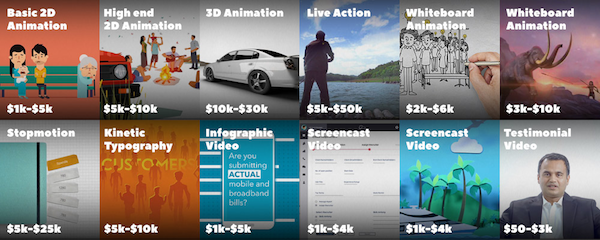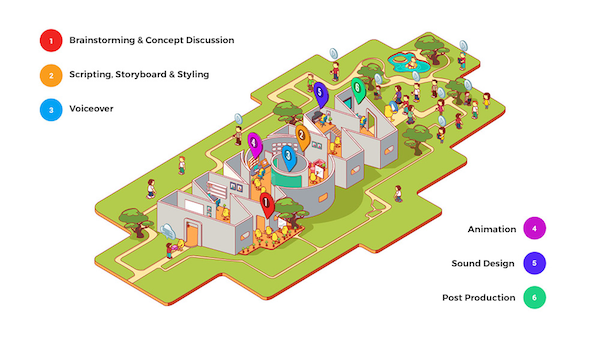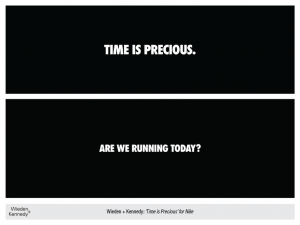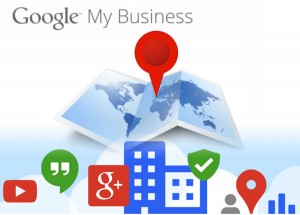— November 17, 2017

Even if you didn’t know what it was called at the time, you’ve almost certainly seen an explainer video before.
What are explainer videos?
You know them. You do.
Explainer videos are short online marketing videos, usually between 30 seconds to two minutes long, that explain your company’s product or service.
Explainer videos can be live-action or animated, but are always fast-paced, to-the-point, and usually feature a professional voiceover.
But what do they do?
Why have an explainer video?
The purpose of an explainer video is to explain something. Usually it’s your product or service.
It’s kind of like an ad, only it condenses your entire proposal or pitch.
Explainer videos cover:
- who you are
- what you do
- what your product is
- what its benefits are
And it does it all in a single, short, hopefully entertaining, video.
Types of explainer videos
There are 9 various types of explainer videos, and it will be important for you to know which kind you want, or which variations.
This can help you determine which agencies to work with or how to craft your message.
1. Live action videos.
Live action videos are an overall type of video and mean that these are not animated. Live action videos use people in real, live action –– often showing someone how to use a product or walking them through it.
2. Whiteboard videos.
Whiteboard videos are video recordings of someone drawing out ideas and concepts on a whiteboard. The whiteboard video is usually sped up to keep up with a voiceover.
3. 2d videos.
A 2D explainer video is an animation shown in only 2d. 2D videos look like drawings on a piece of paper and often have various aspects of the picture animation for interest.
4. 3d videos.
3D explainer videos are also animations, shown this time in 3D. 3D videos are helpful in graphic product breakdowns that show all angles of a product.
5. Stopmotion videos.
Stop-motion explainer videos are typically a variation of 2D explainer videos. Instead of the screen flowing seamlessly from one frame to another, the stop-motion video adds in elements throughout the course of the video to build out a frame.
6. Kinetic typography videos.
A kinetic explainer video is one that uses voice over and moving text in a visually appealing way. The text usually tells a story and moves along to a voiceover and/or music.
7. Infographic videos.
An infographic explainer video is a breakdown of an infographic into rectangular frames. They use a combination of text and graphics (typically icons) to tell a story. There is occasionally voiceover.
8. Screencast videos.
Screencast explainer videos are ones with a voiceover walking you through an actual product. Screencasts are most often used for demos, but can also be useful in showing the ease and simplicity of a platform.
9. Testimonial videos.
Testimonial explainer videos are videos that use customers to tell a positive story about the brand. Testimonial videos are a variation of social proof.
Where are explainer videos found?
Anywhere you can embed a video. That includes your:
- Homepage
- Product page
- Emails
- Social media channels
- YouTube
In fact, a lot of explainer videos live on their owners’ YouTube front pages, since having one there is a great way to introduce yourself to customers and potential customers in a format that’s easy to digest and share.
The power of explainer videos on your website
There are endless benefits to a well-made explainer video. You can use explainer videos to:
- Increase conversions
- Customer engagement
- Customer acquisition
- They even have the potential to go viral and increase brand awareness.
Explainer videos also work great on your landing page.
Studies have shown that landing pages which include a video, enjoy 80% greater conversions.
And for email, the numbers are pretty astounding, too. Including a video in your emails can…
- Boost open rates by 19%.
- Boost click-through rates by 65%.
- Reduce unsubscribes by 26%.
And if you’re looking to increase your Google ranking (who isn’t?) then you should know this:
Embedding your own high-quality videos on your site can make you 53x more likely to show up on the first page of results.
A golden opportunity for any ecommerce business!
 “Video marketing is exploding in popularity and will eventually be the most popular way to market a business. Because video is a visual medium, videos are extremely effective when it comes to improving people’s understanding of your product or service.”
“Video marketing is exploding in popularity and will eventually be the most popular way to market a business. Because video is a visual medium, videos are extremely effective when it comes to improving people’s understanding of your product or service.”
— Neil Patel, Founder of KissMetrics & Co-Founder of Crazy Egg
And it gets better…
- 93% of businesses that use video believe that it has increased user understanding of their product or service.
- 36% of businesses believe that they’ve received less support queries as a result!
- 45% of businesses who use video say they have an explainer video on their home page.
- 83% say their homepage has become more effective
Increase conversions, build loyalty –– use an explainer video!
 “Explainer videos prominently featured on the homepage can increase conversions significantly. You never want to overload a visitor with copy, but it’s hard to distill all of your features and benefits to images and quick blurbs of text.
“Explainer videos prominently featured on the homepage can increase conversions significantly. You never want to overload a visitor with copy, but it’s hard to distill all of your features and benefits to images and quick blurbs of text.
Explainer videos allow you take the 300 words you can’t find room for and cut it down to a 30 second video that’s visual, helpful, and conversion-focused.”
— Sujan Patel, Growth Marketer & Co-Founder at WebProfits
Pretty incredible, right? So…
Where in my sales funnel should I use an explainer video?
Anywhere you’ve got something that needs explaining.
Most often, explainer videos are made to communicate a complex or lengthy idea, even an entire business.
You don’t need an explainer video for every single product in your catalog.
But, if you’ve got a particularly complex product or idea — something like #TeamCatMojo — which would be better explained with a video, then an explainer video could be for you.
Thinking about your sales and conversion funnel, there’s almost always some way to work an explainer video in at any stage.
Take your basic 4-stage sales funnel…
You could apply an explainer video to every stage of this funnel to help potential customers understand your offering and move them onto the next stage.
How?
Awareness Stage
Somebody is still unaware, or has just become aware that you exist. Maybe they stumbled upon your YouTube channel or your website, or maybe they clicked on a link shared by a friend.
Most likely, they saw your explainer video promoted or advertised on Facebook.
This kind of explainer video introduces your business. Specifically, the problem you’re out to solve.
It’s okay to get into product specifics here if you only have one main thing that you make, but think of this as your elevator pitch.
This is your first time with a potential new customer, so make it count by making it clear how your product can solve the problem or fill the need they’ve got.
Interest Stage
By now you’ve got their attention. They know who you are and what you do.
Here, your explainer video might be focused on a particular product or category of products.
In your first explainer, you talked about how your business can help out at high, not too complex level. In this explainer, you can go into a bit more detail.
What do you talk about? Here’s a few ideas:
Testimonials, features, benefits, are all great to include at this stage. You want to create more of an emotional connection.
Make the Emotional Element Pop
 “Explainer videos are a great opportunity for any business to introduce or explain their products/services within context. A product page on its own can certainly get your message across but using video will elevate your message to include an emotional element which is one the foundations of sales & marketing.”
“Explainer videos are a great opportunity for any business to introduce or explain their products/services within context. A product page on its own can certainly get your message across but using video will elevate your message to include an emotional element which is one the foundations of sales & marketing.”
— Aldrich Obach, Inbound Specialist at HubSpot
Decision Stage
Alright! They’re getting closer to hitting that BUY button. Now’s the time to really pile on the benefits. Get them excited about the specific thing they’re interested in.
Here, your explainer should include as much high-quality footage and images of your product as possible, with every single feature and benefit clearly explained and demonstrated.
Action Stage
They’re either about to click BUY, or already have.
This explainer is all about closing the deal for those last-minute, possibly hesitant shoppers.
Heavy on the visuals and benefits, this is as close as it gets to holding your product in their hands.
13 ecommerce explainer video examples
Your explainer video covers all the bases at once. It’s the perfect means to turn cold prospects into leads, and leads into customers.
Why Explainer Videos Work
 “There are two kinds of people, one that goes with verbal learning and others that go with visual learning. Explainer videos have both powers, which allow more people to engage with it and thus, have more power to convert visitors into leads.”
“There are two kinds of people, one that goes with verbal learning and others that go with visual learning. Explainer videos have both powers, which allow more people to engage with it and thus, have more power to convert visitors into leads.”
– Moosa Hemani, Founder & CEO of SETalks
OK, so let’s see some already!
1. Everything Orgo.
At six seconds, Orgo’s explainer is proof that you don’t have to get fancy to be effective.
2. Biaggi.
Biaggi’s folding luggage explainer uses real people and product demonstrations. No fancy cuts or edits, but you get the jist of what they’re selling.
3. Tommy John.
Tommy John clothing is made to eliminate bunching, stretching, riding and all that other annoying stuff.
Their explainers are slick, lively and use top-quality animation –– and prove their brand promise.
4. Native Union.
Native Union has done a great job of growing their business over the past few years, thanks in no small part to their attractive, high-quality explainer videos.
5. Rand McNally.
Just because a product isn’t consumer-focused, doesn’t mean it can’t benefit from an explainer. In fact, these kind of technical products are often the best to equip with an explainer.
6. BombTech Golf.
BombTech Golf has been wildly successful over the past couple of years, and while they might not throw a ton of money at their explainer videos, they certainly work!
In fact, these videos prove that you don’t need fancy cuts or expensive videos in order to sell product using this strategy.
7. The Human Solution.
When you’re selling something like a standing desk, a product demonstration video is essential. The Human Solution’s explainer is a great example of a demo done well.
8. Fugoo.
Another excellent example of how voiceover, some great camera work and cool music can really help to elevate a simple product demonstration.
9. New Chapter Vitamins and Supplements.
You don’t need a huge budget to make an effective explainer video, either. A single camera, some music and few graphics can help to boost engagement and conversions.
10. Spinning.
Spin bikes aren’t cheap, so having an expert walk you through the benefits to help you choose the right one, that’s perfect for an explainer video.
11. Training Mask.
Training Mask uses top notch animation to introduce their latest line of performance training masks.
12. RockTape.
Ever wondered what that tape is that you see athletes wearing? RockTape’s got an explainer video for that.
13. DiBruno Bros.
You can present your explainer video, too. It doesn’t have to be a voice over.
Alright, but wait a minute…
How do I make an explainer video & how much does it cost?
The real beauty of an explainer video, is that it costs as much you want it to cost.
You’re not limited by your budget, but by your own team’s creativity. Some of the examples above were made with next to zero budget.
If you have a camera, a product and the time to write a script (you can even wing it if you know your customers’ pain points well enough), you’ve got everything you need for a great explainer video.
But, if you did want to pay for something, and you need some ballpark figures, we’ve got you covered.
How much explainer videos cost
- Basic 2D animation videos: $ 1k-$ 5K
- High-end 2D animation videos: $ 5K-$ 10K
- 3D animation videos: $ 10K-$ 30K
- Live action videos: $ 5K-$ 50K
- Whiteboard animation videos: $ 2K-$ 6K
- Stop Motion videos: $ 5K-$ 25K
- Kinetic typography videos: $ 5K-$ 10K
- Infographic video: $ 1K-$ 5K
- Screencast video: $ 1K-$ 4K
- Screencast video: $ 1K-$ 4K
- Testimonial video: $ 50-$ 3K

As for how paid explainer video are made. It’s a six-step process.
How explainer videos are made
- Brainstorming and concept planning: The first stage is to get down as many ideas as possible. Loose ones at first, just let your creativity flow. This is the basis of your explainer.
- Scripting and storyboarding: Once you’ve narrowed down your idea, it’s time to storyboard it. Storyboarding is the process of drawing out individual scenes (how product features will be shown off) to help visualize the final result.
- Styling: It’s important to style up your explainer before going into production. This might include getting mock-ups done of characters and graphics, so that you’re happy everything matches your brand.
- Voiceover: A great voiceover can make or break an explainer video. A bad voiceover, one that isn’t clear, confident or well-produced, can be distracting.
Animation: The cost of animation varies a lot depending on the style you want. Take a look at the costs outlined in the image above for guidance. - Sound design: Choosing the right soundtrack for your explainer is important, too. Just like your voice over, a bad backing track can be at best distracting, or at worst a complete turn-off.

The explainer video production process, WowMakers
Of course, if you’re making an explainer video with live actors, the animation and voiceover stages might become shooting stages, but it’s still important to style your explainer beforehand, so that everything you’re doing matches the tone and appearance of your entire brand.
The Time for Explainer Videos in Omnichannel Marketing is Now
 “Video advertising is something your competitors are sleeping on. Because of YouTube and Facebook, video unlocks a brand new channel of conversion volume that can’t be tapped otherwise. In addition to that, explainer videos are the most powerful way to generate conversions for products/solutions/services that don’t have a lot of demand already.
“Video advertising is something your competitors are sleeping on. Because of YouTube and Facebook, video unlocks a brand new channel of conversion volume that can’t be tapped otherwise. In addition to that, explainer videos are the most powerful way to generate conversions for products/solutions/services that don’t have a lot of demand already.
They can educate and explain complex topics in delightful ways that not only bring sales, but can help build your brand equity over time too.”
— Jonathan Dane, Founder & CEO at KlientBoost
Final Word
Phew! That’s a lot to take in. Let’s wrap this up with a few solid tips for getting the most out of your explainer video.
How to create high-converting explainer videos
- Nail the script — If you can hire a professional, do so.
- The shorter the better — Under a minute is great (don’t go over three minutes)
- Benefits over features — Focus on the benefits your products can bring first, rather than how cool its features are
- Great lighting and sound — You don’t have to go pro if you can’t afford to, but uphold as high of a production value as you can
- A clear CTA — Let people know where they can visit for more information, or where to buy
- Create for your audience — Don’t create content for the sake of it and then try to find an audience. Find out what’s bugging people, and make content to address it
- Have fun — Making videos should be fun, so don’t let the process become a grind.
And if you’re still not convinced that video is worth the effort, we’ll leave you with this kicker…
YouTube is the second most popular search engine in the world.
How about that?
Digital & Social Articles on Business 2 Community
(80)
Report Post








